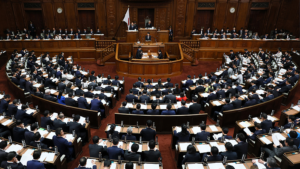
Ceasefire Enables Critical Repairs at Zaporizhzhia Nuclear Plant
A localized ceasefire at Zaporizhzhia Nuclear Power Plant enables critical repairs after February’s infrastructure damage, with IAEA involvement ensuring safety.

Cambodian King and Queen Mother Begin Beijing Visit
Cambodia’s King and Queen Mother arrive in Beijing for strategic talks, celebrating 10 years of comprehensive partnership between the two Asian nations.

Paramount Secures Warner Bros in $31B Deal as Netflix Exits Bidding War
Paramount clinches Warner Bros in a $31B deal after Netflix exits bidding war, creating a streaming giant facing regulatory scrutiny.

China-Germany Economic Ties Strengthen Amid Global Shifts
German Chancellor Merz’s Beijing visit highlights strategic economic cooperation with China as Germany seeks to address trade imbalances and expand exports.

Convenience, Cost, and Competition: Daily Life in China’s Fast-Paced Society
Exploring the realities of daily life in China: From 24/7 convenience to affordable education and shifting work-life priorities. A ground-level look at a society in flux.

Pegasus 3 Fuels Global Box Office Surge During 2026 Chinese New Year Season
The 2026 Chinese New Year film season sees ‘Pegasus 3’ driving international interest, blending high-speed racing with the scenic landscapes of Ganzi.

China’s Sparrow-X2 eVTOL Redefines Air Ambulance Efficiency with 1,200 km Range
Wuhan Fosenix unveils the Sparrow-X2 eVTOL, a cost-effective air ambulance with a 1,200 km range, set to transform emergency medical services across the Chinese mainland.

Chinese Tech Brands Lead Global Innovation in 2026, Surpass Japan in Rankings
China’s tech brands achieve record growth in 2026, overtaking Japan in global innovation perception, per Brand Finance report.

China Rejects U.S. Call for Trilateral Nuclear Talks as ‘Unfair’
China dismisses U.S. proposal for trilateral nuclear talks, citing unfair demands and significant nuclear arsenal disparity. Foreign Ministry emphasizes disarmament responsibility.

China Urges Ceasefire Between Pakistan and Afghanistan After Border Clashes
China calls for immediate ceasefire between Pakistan and Afghanistan following recent border clashes, emphasizing regional stability and dialogue.

China’s Green Wall Holds Back Taklamakan Desert in 2026
China’s 50-year effort to contain the Taklamakan Desert shows success in 2026, with green industries turning ecological gains into economic opportunities.

Xizang’s High-Altitude School Champions Inclusive Education in China
Xizang’s Nagqu Special Education School leads China’s push for quality inclusive education, achieving 97% enrollment and 85% graduate employment for students with disabilities.

Pakistan-Afghanistan Border Tensions Escalate Amid Airstrikes, UN Urges Calm
Pakistan’s airstrikes in Afghanistan prompt retaliatory attacks, escalating tensions. UN calls for restraint as cross-border clashes intensify.

U.S.-Iran Nuclear Talks: Progress Amid Military Buildup in 2026
U.S. and Iran continue 2026 nuclear talks amid historic military buildup. Latest Geneva round called ‘most serious’ yet, signaling cautious diplomatic progress.

PLA Navy Concludes South China Sea Patrol Amid Regional Tensions
PLA Navy completes routine South China Sea patrol, reaffirms commitment to regional stability amid Philippines-led joint exercises with external partners.

Taibo Temple Fair Merges Cinema with Tradition in Jiangsu
Wuxi’s Taibo Temple Fair combines film technology with ancient traditions, offering immersive cultural experiences through augmented reality and heritage workshops in 2026.

NBA Grapples with Tanking Dilemma: Can Competitive Integrity Be Restored?
The NBA considers major reforms to address strategic losing as teams balance competitiveness with draft incentives. Global fans and analysts debate the league’s next move.

Chinese Table Tennis Stars Dominate 2026 WTT Singapore Smash Quarterfinals
Chinese table tennis stars advance to WTT Singapore Smash quarterfinals, with Wang Chuqin leading medal charge in 2026 tournament.

China Stages Thrilling Comeback to Defeat Japan in FIBA World Cup Qualifier
China overcomes 14-point halftime deficit to secure 87-80 victory against Japan in FIBA World Cup Qualifying, boosting Group B standings.

Wu Yibing Exits ATP Mexican Open in Quarterfinals Despite Valiant Effort
Chinese tennis star Wu Yibing falls to Italy’s Flavio Cobolli in ATP Mexican Open quarterfinals but achieves career milestone with first ATP 500-level quarterfinal appearance.













